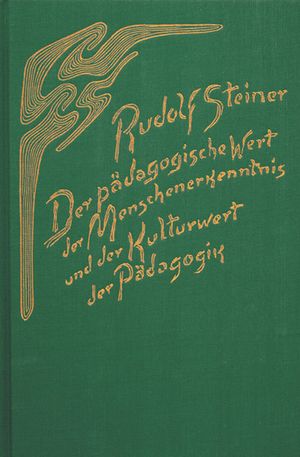GA 310


The Pedagogical Value of the Knowledge of Man and the Cultural Value of Pedagogy
Ten public lectures, Arnhem/Holland 17 to 24 July 1924.
The underlying thesis of these lectures, volume 20 in the "Foundations of Waldorf Education" series, is that true education must be based on knowledge of the whole human being and that such knowledge cannot be attained without love. On this basis, Steiner presents his understanding of every aspect of child development--bodily, psychological, and spiritual.
At the same time, Rudolf Steiner shows that, to prove worthy of their calling, teachers must begin a process of inner development. In Steiner's view, it is human beings who give value and meaning to the world. Modern education, however, is gradually undermining this meaning. These lectures demonstrate that education can heal that lack of meaning and restore the meaning of humankind for the world.
Steiner also discusses the practical, day-to-day operation of the school. He talks about styles of teaching, teacher conferences, parent-teacher meetings, and how Waldorf education is related to the anthroposophic movement.
This book, while serving as a good introduction to Steiner's ideas on education, also represents the fruits of four years experience in the Waldorf school.
„No such lecture cycle is ever complete in an encyclopedic way, but each nevertheless covers 'the basics' in its own way. Any lecture by Rudolf Steiner also has its own incomparable value. Yet this sequence is truly extraordinary and incomparable in a different way, both because it is the last that Steiner gave on education and because, in his last months, Steiner was graced with a remarkable clarity and penetration that allowed him to address old topics (as well as new) with uncanny spiritual luminosity, precision, and sheer humanity. If anyone is looking for the 'last word' on Waldorf education, this is perhaps it -- in more ways than one.“
Contents (selection)
Introduction by Christopher Bamford
1. The Need for Understanding the Human Being
2. Incarnation of the Human Being in a Physical Body
3. Walking, Speaking, Thinking
4. The Three Stages of Childhood
5. Teachers' Conferences in the Waldorf School
6. Parent-Teacher Meetings
7. The Temperaments and the Human Organism
8. Diet and the Four Temperaments
9. Styles of Education
10. Education and the Anthroposophic Movement
Index
Literature
- Rudolf Steiner, Christopher Bamford (Introduction): Human Values in Education. CW 310. Anthroposophic Press 2005. ISBN 978-0880105446; eBook ASIN B007D0DWSC rsarchive.org
German
- Rudolf Steiner: Der pädagogische Wert der Menschenerkenntnis und der Kulturwert der Pädagogik, GA 310 (1989), ISBN 3-7274-3100-8 English: rsarchive.org German: pdf pdf(2) html mobi epub archive.org
 |
References to the work of Rudolf Steiner follow Rudolf Steiner's Collected Works (CW or GA), Rudolf Steiner Verlag, Dornach/Switzerland, unless otherwise stated.
Email: verlag@steinerverlag.com URL: www.steinerverlag.com. Index to the Complete Works of Rudolf Steiner - Aelzina Books A complete list by Volume Number and a full list of known English translations you may also find at Rudolf Steiner's Collected Works Rudolf Steiner Archive - The largest online collection of Rudolf Steiner's books, lectures and articles in English. Rudolf Steiner Audio - Recorded and Read by Dale Brunsvold steinerbooks.org - Anthroposophic Press Inc. (USA) Rudolf Steiner Handbook - Christian Karl's proven standard work for orientation in Rudolf Steiner's Collected Works for free download as PDF. |
